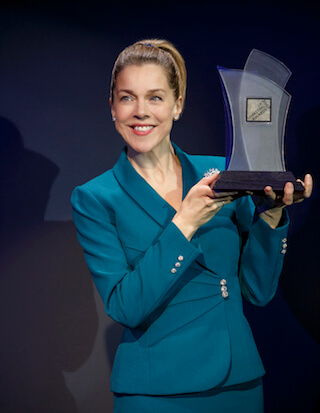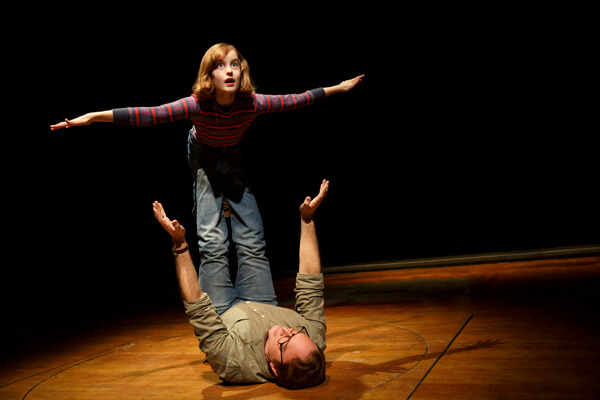Laura Osnes and Santino Fontana in “Cinderella.” | CAROL ROSEGG
BY CHRISTOPHER BYRNE | The reverence that many gay men of a certain age have for Lesley Ann Warren’s eternal hold on the role of Cinderella led to collective gasping and pearl clutching upon the announcement that Rodgers and Hammerstein’s beloved musical would “updated” by Douglas Carter Beane. Many of the distraught no doubt still imagined themselves singing “In My Own Little Corner.”
They need fear no longer. Their arrested development is safe in the hands of Beane and team, who have created a sprightly, delicious, and thoroughly entertaining production — the first time that this show, created for television, has appeared on Broadway. Beane’s book adds a little political intrigue, a strong social consciousness, and a hint of gender equality, all without losing the delightful music or the wicked stepmother. Snap at me for saying so if you will, but Beane’s book is a lot more sophisticated and interesting than the original. Unlike so much today, this was written for adults, though children will enjoy it, too.
Cinderella” is a pure delight, while “The Flick” works your last nerve
The basic story you know, but Beane’s update posits a ruling political class out of touch with — and indifferent to — the realities of real people’s lives. Intrigue ensues when the Prince makes his Henry V-type transition from callow youth to caring ruler. Finally, happily every after seems possible — at least until the next regime change. All of this is handled comically, but the pointed message is inescapable.
The production is a true Broadway spectacle. William Ivey Long’s costumes are eye-popping, humorous, even magical. Anna Louizos’ sets are extraordinary, as is Kenneth Posner’s lighting. The dazzle of it all is a big part of the fun.
One would expect Victoria Clark to be wonderful as Marie, the fairy godmother, and she is. She has a magnificent voice, and also a gift for intelligent comedy. Comedy of a broader stripe comes from Harriet Harris as the evil stepmother, who is fantastic. Ann Harada as one of the stepsisters, Charlotte, has a sense of self-awareness that gives the character an edge, and Marla Mindelle as the other stepsister, who ultimately colludes with Cinderella, is perfect.
One wishes that the villain, Sebastian, didn’t have to be a mincing gay man —that’s one convention Beane or director Mark Brokaw, who otherwise does a splendid job, should have excised. Unfortunately, that’s about the limit of what actor Peter Bartlett can do, and here in “Cinderella,” he does it again.
As Cinderella, Laura Osnes takes her place as a legitimate Broadway leading lady. Her voice just gets better and better, and her presence is luminous. The real surprise of the evening, though, is Santino Fontana as the Prince. In performances in “Sons of the Prophet” and “Brighton Beach Memoirs,” he’s shown himself to be an exceptionally talented actor. He’s also got a wonderful voice, and Beane has given him a role with a complexity he evokes perfectly.
It’s wonderful to see this classic show get such vibrant new life. It was a ball, and I can’t wait to go back.
Playwright Annie Baker has, in the past, wrought marvels. “Circle Mirror Transformation” and “The Aliens” illuminated the tiniest details of lives with a subtlety and simplicity that turned an acting class in a rec center and a clubhouse for slackers into portraits of unique individuals, most of them adrift in the world and longing for connection. These spare, compact plays pack a punch one doesn’t see coming, and it’s no surprise that “Circle Mirror Transformation” has become one of the most widely produced plays of recent years.
Anticipation was high in advance of Baker’s latest play, “The Flick” at Playwright’s Horizons, so perhaps it’s not surprising that critical disappointment, when it came, has been harsh. Still, this is not a total loss. The three employees of a single screen movie theater in suburban Massachusetts we see as they clean up between screenings are, like characters in Baker’s earlier plays, floundering to find their way.
Sam, a 35-year-old who lives with his parents, teaches Avery, about to leave for college in the fall, the ins and outs of the job, and a friendship of sorts begins. The two men, along with Rose the projectionist, all have a passion for movies. The possibility the theater will be sold and its 35mm projector will be replaced by digital projection is anathema to them. It doesn’t help that new management could also shut down their ticket scamming. As with Baker’s other plays, no real resolution is achieved; the story lies in what we learn about the characters.
What in her other plays is moving, however, becomes ponderous in “The Flick.” Clocking in at three hours and 15 minutes, the play is bloated to the point of self-indulgence. Baker pounds us over the head with her messages, and the bleak poetry she finds in the quotidian becomes tedious. She seems incapable of trusting her audience to understand her intention in any way other that unspooling it in real time, creating a product that is a little too ersatz Warhol.
The theme that people working in menial jobs must be inherently flawed comes across as elitist, and her conceit that people immerse themselves in movies and trivia to compensate for other things lacking in their lives is unoriginal. The character of Sam is just lazy playwriting; in 195 minutes, the audience deserves more than just a sketch of him.
Director Sam Gold, who has done finely detailed work on Baker’s previous plays, isn’t helpful here. If a plays has silences of several minutes, they must be employed judiciously and, during them, the actors need to work hard to keep the story alive. Here, too many times the play simply stops dead.
Matthew Maher as Sam turns in a fairly predictable performance as an embittered white man on the brink of middle age whose life is going nowhere. Aaron Clifton Moten is interesting as Avery, a black man whose knowledge and passion for movies is the only thing that seems to animate him. He is truly a lost soul, even oblivious to the awkward sexual advances of Rose. Louisa Krause is understated as Rose and gives the most complex performance in the evening, moving beyond the cliché of another tough girl whose abrasiveness hides vulnerability to show us a young woman whose insensitivity makes her life a tiny tragedy.
But Rose is the only character we see inside of — and she’s on stage for the least time of the three. In Baker’s other plays, we want to know more about the characters. In “The Flick,” we’re likely to feel they’ve overstayed their welcome.



































